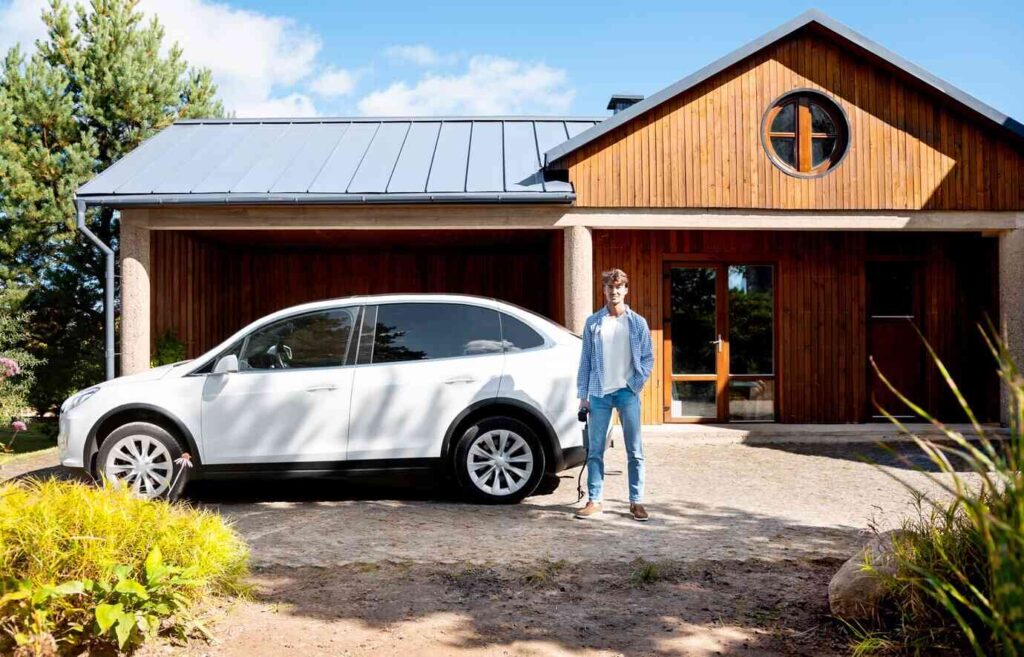Your garage just became your personal fuel station. No more price shocks, no more lines, and no more weird smells—just pure, convenient power delivered while you sleep. The right home charger transforms EV ownership from a compromise into an upgrade.
But all chargers aren’t created equal. The market has exploded with options from established electric car charger manufacturers to budget newcomers, making your choice consequential for charging speed, safety, and long-term satisfaction.
Understanding Charging Levels: Power Matters
Your charging speed directly impacts your daily EV experience. The difference between Level 1 and Level 2 charging isn’t just technical—it’s the difference between an overnight full charge and barely recovering your daily commute.
Level 1 charging offers:
- Standard household outlet compatibility (120V)
- No installation required
- Slow charging (2-5 miles of range per hour)
- Adequate only for plug-in hybrids or minimal daily driving
Level 2 charging delivers:
- Dramatically faster charging (15-40 miles of range per hour)
- 240V power similar to what your dryer uses
- Complete overnight charging for most EVs
- True convenience that makes EV ownership effortless
Amperage and Future-Proofing
Higher amperage chargers cost more upfront but prevent expensive upgrades later. As battery capacities grow, your charging needs will too.
Key considerations include:
- Entry-level 16-amp chargers work for today’s basic needs
- Mid-range 32-amp units balance cost and capability
- Premium 40-50 amp chargers accommodate future battery growth
- Your electrical panel must support your chosen amperage
Think of amperage like water pressure—more means faster filling. While a 16-amp charger might seem adequate now, you’ll appreciate those extra amps when your next EV comes with a battery twice the size of your current one.
Smart Features: Convenience or Complication?
Connected chargers offer compelling benefits but introduce complexity and potential privacy concerns. Decide whether scheduling, monitoring, and remote control justify the price premium.
Smart chargers typically provide:
- Scheduling to charge during off-peak rates
- Energy consumption tracking and reporting
- Remote control via smartphone apps
- Integration with home automation systems
- Over-the-air updates for future compatibility
However, basic non-connected chargers offer:
- Lower purchase cost
- Zero subscription fees
- Complete privacy
- Fewer potential points of failure
- Simplicity that just works
Hardwired vs. Plug-In Installation
Your installation choice affects portability, cost, and potentially your home’s resale value. This decision impacts more than just how your charger connects to power.
Hardwired installations offer:
- Potentially higher charging capacity
- Cleaner aesthetic appearance
- Permanent home improvement status
- Potential electrical code compliance advantages in some areas
Plug-in options provide:
- Easier installation and removal
- Portability when moving
- No electrician required for charger replacement
- Flexibility to upgrade without rewiring
Weatherproofing: Indoor vs. Outdoor Installation
Outdoor chargers must withstand everything from scorching heat to freezing rain and everything in between. Don’t compromise on weather resistance if your charger will live outside.
Outdoor-rated chargers feature:
- Robust weatherproof enclosures
- Temperature tolerance from sub-zero to extreme heat
- UV-resistant materials that won’t degrade in sunlight
- Water and dust intrusion protection
- Corrosion-resistant connections
If your charger will live in a garage or protected carport, you can potentially save with an indoor-rated model, but the small price difference rarely justifies the risk.
Cable Length and Management
Cable length determines where you can park and still reach your charging port. This seemingly minor detail significantly impacts daily convenience.
Consider these factors:
- Standard 12-foot cables work for predictable parking scenarios
- Extended 18-25 foot cables offer flexibility for multiple parking positions
- Integrated cable management prevents tripping hazards
- Thicker cables generally handle higher amperage but are less flexible
- Your car’s charging port location affects optimal cable length
Warranty and Support
Charger reliability directly impacts your daily transportation. When a charger fails, your car becomes temporarily useless until you find alternatives.
Look for manufacturers offering:
- Minimum 3-year warranties
- Established reputations for reliability
- Responsive customer support
- Available replacement parts
- Professional installation networks
A quality charger from a reputable manufacturer typically costs more but delivers peace of mind that pays dividends over years of daily use.
Compatibility With Current and Future Vehicles
Universal J1772 connectors ensure broad compatibility across brands. While proprietary connectors exist, standardization is the clear industry direction.
Ensure your charger:
- Uses the standard J1772 connector for North American vehicles
- Accommodates your current and anticipated charging needs
- Offers firmware updates if available
- Works with your specific vehicle’s onboard charging capabilities
End Note
The home charger ecosystem continues evolving alongside vehicle technology. Your investment should accommodate not just the EV in your garage today, but the ones that will replace it over your charger’s lifespan. Choosing wisely now means more satisfied charging experiences for years to come.

